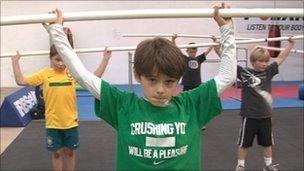Call for mandatory PE tests alongside maths and reading
- Published
Adam Brimelow and a young volunteer try out some of the suggested fitness routines for themselves
Sports medicine specialists say governments across the UK have squandered the chance to create an Olympic legacy of fitness.
Their conference in London is calling for mandatory "physical literacy" tests in schools, alongside reading and maths.
They say this could help children with health problems and identify future sports stars.
Unions and the Youth Sport Trust say tests would be counter-productive.
Writing in this week's Scrubbing Up column, leading sports medicine specialist Dr Andy Franklyn-Miller warns that the physical competence of future generations is being put at risk because of a failure to give PE the same priority as other subjects in the school curriculum.
He contrasts the support that is available for children who struggle in maths or English with the approach to physical development, cardiovascular fitness and co-ordination - elements of what he calls "physical literacy".
"Let us achieve future success now by building in a PE curriculum that embraces push, pull, squat, brace, rotate, accelerate and change of direction."
Dr Franklyn-Miller argues that there should be compulsory tests for these skills at each of the key stages as children progress through school.
"Let it be competitive and let us test our children against each other and identify those who need support from the network of physicians trained in sport and exercise medicine as an existing Olympic legacy."
Start to Move
The call coincides with an announcement by the Youth Sport Trust that it will train thousands of primary school teachers across England in specialist PE skills.
The charity's new Start to Move programme, funded by private medical firm Bupa, offers free training and support - focusing on the same principles of physical literacy rather than particular sports. The aim is to reach all primary schools in England in the next three years.
But its chief executive, Baroness Sue Campbell, is against the idea of testing.
"Whilst I'm all for assessment, all for challenge, all for encouraging the best to develop and supporting the less capable to catch up, I think if you introduced very rigorous testing in the way that's being described, I think that could have quite a negative impact on some children."

Compulsory PE tests in schools are being called for alongside reading and maths tests
Russell Hobby, general secretary of the National Association of Head Teachers, said the tests would be used if they were helpful and well-publicised. But he said they must not be mandatory.
"If this is another accountability measure for schools to rank them, then it will be counter-productive. Nor does it need to be compulsory. Schools have to demonstrate progress-tracking to Ofsted in every subject, including PE."
Christine Blower from the National Union of Teachers said that PE lessons should be positive and encouraging.
"The idea of testing is potentially negative and could act as a potential brake on participation," she said.
Dr Franklyn-Miller insists that without mandatory testing, and clearly defined steps to help children who fall short, nothing will change.
Health and well-being
This week he is chairing a major conference in London for the British Association of Sport and Exercise Medicine, which has endorsed a series of five-minute fitness routines put together for schools by the international fitness coach Kelvin Giles.
He says governments across the UK must act to protect the health - and fitness - of future generations.
"We have our children in one place for seven hours a day. We've got them in front of us. Now we can influence their numeracy, influence their literacy. Maybe we should start influencing their physical literacy, their health and their wellbeing, when we've got them in front of us. So it means an adjustment to the national curriculum."
A spokesman for the Department for Education in England insisted that PE already has a high priority.
"We have been clear that children need access to high quality physical education (PE). It will remain a compulsory part of the curriculum, which will set out a clearer expectation that all pupils should play competitive sport, and will retain the expectation that all children should learn to swim."
- Published21 November 2011
- Published26 November 2010